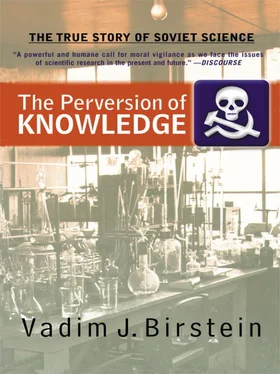While I worked above the Arctic Circle, I managed to publish my second scientific book on genetics (Cytogenetic and Molecular Aspects of Vertebrate Evolution) at the Academy Publishing House, Nauka. 306There was a separate struggle with the KGB concerning publishing this book. I had several special meetings with KGB officers at their headquarters regarding the documents necessary for publishing it, which had been confiscated by a KGB agent. Finally, the intervention of Academician Aleksandr Yanshin, who was vice president of the academy (in the Earth Sciences Division) and president of the Moscow Society of Naturalists and who supported my book, saved the situation and the book was finally published in 1987. I defended it at my institute in Moscow as a Doctor of Biological Sciences thesis. The book was also given an award by the Moscow Society of Naturalists.
In three years, I was back in Moscow, and after 1990, I was able to work at the Koltsov Institute of Developmental Biology. Despite all the talk about perestroika and glasnost in the press (Mikhail Gorbachev’s new Party line of openness and partial freedom of the mass media), nothing had changed in terms of KGB control of the academy institutes in Moscow. The same officer worked at the First Department of the institute, and to attend a conference or work abroad, a scientist still needed permission from the same “mysterious” organs, alias the KGB.
I saw the institute’s First Department officer for the last time when I visited Moscow in 1997. I had been working in the United States for six years already and had been listed at my institute in Moscow all that time as being on leave of absence. The officer told me: “It’s really unfortunate that the Institute’s best guys like you are working abroad now.” It seemed that he had completely forgotten that several years before, his organization—the KGB—almost turned me into a political prisoner with his help. In 2000, he was still at the institute.
In 1990, after my return to Moscow, I joined the Moscow human rights group Memorial, which is dedicated to the memory of the victims of the Soviet regime. Memorial collects documentary materials and helps survivors of Stalin’s camps. I was interested in the history of the control of science, especially biology, and in the fate of foreign prisoners in the Gulag. Soon I realized that there was an early unknown area of Soviet-controlled science—like in Nazi Germany, a special secret laboratory that used human subjects for biomedical experiments. The fact that some members of the scientific elite not only knew about these experiments but supported them was especially shocking.
PSYCHOLOGICAL UNDERPINNINGS
No doubt the interventions of the Party and secret services in scientific issues, including the rise of Lysenko, had an ideological and psychological origin. Stalin and the other Party leaders had no formal education or training (Bukharin was an unusual exception from this rule). No doubt on some level this made them feel insecure, especially around educated scientists. This goes a long way toward explaining their desire to dominate and control scientists, even when the destruction of these talented people severely damaged the fortunes of the Soviet Union (for example, declining crop yields because of the Lysenko nonsense).
The personal attitude of Stalin to scientists was very cynical. In the early 1930s, the dictator said to Academician Axel Berg, a well-known radiophysicist and specialist in the theory of information: “Scientists work well only when some of their colleagues are imprisoned.” 307Security commissar Lavrentii Beria’s rudeness toward scientists after he had been appointed head of the Special Committee (the Soviet atomic project) in 1945 308was well known. The outstanding physicist, Academician Pyotr Kapitsa, refused to work under Beria’s supervision (which was almost suicidal). He wrote to Stalin stating his reasons: “Comrades Beria, Malenkov, and Voznesensky behave as superhumans at the Special Committee. Especially Comrade Beria.” 309After this communication was received, Kapitsa was dismissed from the committee, and in 1946, he was deprived of all his positions and put under house arrest until Stalin’s death. 310Stalin personally ordered Beria not to arrest Kapitsa. At a meeting in the Kremlin, Stalin told Beria: “I’ll dismiss him [Kapitsa] if you like, but you mustn’t touch him.” 311According to some sources, later, in 1953, Beria planned an assassination of Kapitsa, evidently as an act of revenge. 312
Kapitsa was the only prominent Soviet physicist who refused to participate in the A-bomb project under the supervision of Beria and other Party functionaries. He consciously decided to follow Pavlov’s example of resistance. Pavlov told him: “…Only I am saying here aloud what I am thinking about, and when I die, you should do the same because this is so necessary for our Motherland.” 313And Kapitsa answered: “I will not be afraid to say what I am really thinking.” It is not surprising, however, that other scientists who were not so prominent did not resist. They knew exactly what would happen to them if they did not succeed in their work. Beria kept in his desk a list of names of all scientists with notes on what kind of punishment, from the death penalty to a certain number of years of imprisonment in labor camps, each scientist would receive if the bomb project was not completed on time. 314Later, in 1980–1981, Kapitsa actively defended Sakharov. He wrote two strong letters to KGB chairman Yurii Andropov demanding the return of Sakharov from exile in Gorky. 315
Academician Kapitsa was right. Like Nazi leaders, the Soviet Communist and NKVD-MGB elite fancied themselves to be superhuman. According to the writer Kirill Stolyarov, the following testimony of MGB colonel Savitsky is in Beria’s MGB investigation file:
Once in Germany B[ogdan] Kobulov [at the time deputy head of the Soviet Military Administration] said in the presence of my wife and Adjutant Mikitenko that people and their descendants are divided by inheritance into the “chosen” and “unchosen.” The “chosen” should be leaders and have key positions in society, and the “unchosen” are only fit to work. When I tried to object to this, Kobulov screamed: “Do not speak drivel, you don’t understand anything!” 316
For the entire time I dealt with the security service officers within the academy, at Moscow University, and especially in the Lubyanka headquarters, I perceived the same attitude: The officers of all ranks tried to show me that they were special and in some way superior to others. The “unchosen” were expected simply to obey the orders from the “chosen” and accept their understanding of life and values, which definitely were opposite to mine. In the current Russian political situation, such officers have become leaders of the government and economy. The control of science has merely shifted: Control according to the ideological Party line has morphed into control through financial support. It is too early to expect that in this climate, moral and ethical issues of science such as choosing whether to participate in the development of new types of biological or chemical weapons (despite all international agreements) will become a serious matter.
According to the writer Leonid Mlechin, Academician Yevgenii Varga (1879–1964), who directed the Academy Institute of World Economy and World Politics from 1927 to 1947 and in the 1920s–1940s was the main economist within the Comintern, 317had a very low opinion of the secret services. In 1947, he stated: “A decent person won’t work as an interrogator or at the secret police. Only the scum of society works there and, naturally, such elements do not follow the issue but they are interested in their own careers. They are suspicious of everyone they observe. They put suspects in prisons until such an atmosphere is created [in the society] when everyone suspects everybody.” 318No wonder that Academician Varga did not enjoy Stalin’s favor. In 1948, he was condemned for his professional economic views and in 1949, the institute he directed was closed down. 319
Читать дальше











